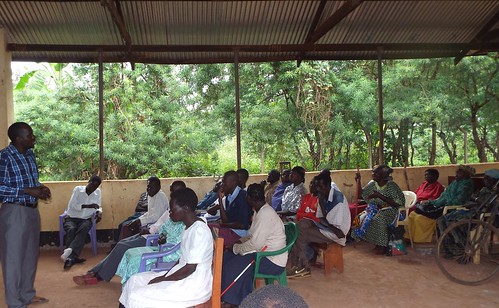What is the difference between sanitation and hygiene? What does your home need in order to be hygienic? What is missing in your community? These were just some of the questions asked during a water, sanitation, and hygiene (WASH) sensitization workshop held at GDPU on Friday.
Around thirty persons with disabilities (PWDs) of every age from the Laroo Division (one of the four areas in downtown Gulu) came to the engaging workshop facilitated by the Laroo Division Inspector of Health. The workshop was funded by AMREF, who provided a small transport refund for participants. As the workshop was conducted in the local Luo language, GDPU program assistant Stephen quietly translated to me.
The discussion was lively and respectful with facilitators making clear that everyone here was adults, but that their main goal was that PWDs “do not keep quiet.” If there was a latrine being built, PWDs should make sure that it was accessible, that by speaking up they would better be able to engage with community projects and push forward their needs.
So, what is the difference between hygiene and sanitation? Participant answers ranged from “hygiene is good health”, “hygiene means having a good latrine”, “hygiene is keeping your body healthy”, “hygiene is having rubbish bins.” The facilitator then explained that hygiene refers to the practices you do to keep your body health, while sanitation refers to the environment. The next question, what does your home need in order to be hygienic? Participant answers were typical with answers like “latrine”, “good water point”, and “rubbish bins” with the facilitator adding a clean kitchen and bathing area. The most interesting answers came when the Inspector asked “what was missing in the community?” Many community members answered that there community was missing proper latrines and no rubbish pit. The most surprising would be that people often climb inside the water points and stand while getting water. The largest conversation came when it was mentioned that people often sleep in the same room as their animals, which the inspector warned against. An elderly lady then tells the facilitator that what else is she supposed to do, someone will steal her goats at night if she does not put them in her house.
While talking to the facilitator after the event it was clear they were attempting in many ways to follow the Community-Led Total Sanitation philosophy which attempts to initiate change by making participants adverse, or even disgusted, with their own unsanitary behaviors. CLTS, however, is often more graphic in nature showing participants clearly that, where they do their business affects what they eat or drink. The facilitator made it clear there’s no real budget here for constructing accessible facilities, but what we can beneficially do is promote behaviors and teach PWDs to speak up on projects happening within their communities.
This program, although small in scale, helped encourage and spark conversation within GDPU on our own program, to provide accessible toilets, and with working with the government to mainstream disability in WASH programming. This program also shows that the local government is aware of the struggles PWDs face in accessing clean water and sanitation. My questions is now that they are asking PWDs to demand their WASH rights, are they ready to provide? Can we (GDPU and members of the community) make institutional change a reality?
Posted By Kathryn Dutile (Uganda)
Posted Jul 28th, 2014



2 Comments
Katerina Canyon
August 1, 2014
Sounds like an interesting time. Do you think you ended up getting more support for your project?